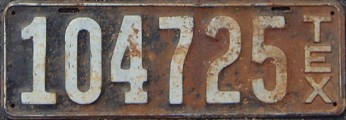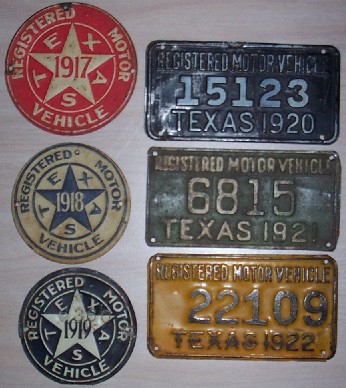Following is a timeline history of Texas automobile registration and license plates.
This information has been compiled by me (Nick DiFonzo) from official State sources,
information from other collectors, the ALPCA archives, and evidence from actual plates. |
Please e-mail me with additional info, corrections, or comments, or interesting pictures.
Pictures are from my personal collection, EBAY, or as noted. |
|
1899
|
|
|
1899:
- The first automobile in Texas, owned by Col. E.H.R. Green of Terell,
terrorizes the Texas countryside.
1907-1916:
- 1907: Texas House Bill #93 required that all motor vehicles used
on public roads be registered with the county clerk. The vehicle recieved
a number in the order registered in each county. That number, at least
six inches in height, was required to be displayed "in a counspicuous
place" on the vehicle.
- Registration began on Aug. 10, 1907. The first Texas license number
is issued, registered to a bus owned by W.B. Chenoweth of Colorado
City, TX.
- Each county had its own series, from "1" onward, so many duplicate
numbers existed.
|
|
- Owners provided their own plates, often made from aluminum house
numbers attached to leather, or from wood, tin, etc. Most of these
showed only the number, with no indication of the state or county.
- Many motorists used porcelain "kit plates" with interchangeable
numbers and often the name of the city or county. These kits were
made by a company in Chicago.
- Some motorists simply painted the number on the vehicle!
- These pre-1917 plates are called "pre-state" plates.
- Some cities had county or city licenses in addition to that required
by the state.
- 1910: 14,286 registered vehicle
|
| 1917
|

1917 plate ("first batch")

Radiator Seals from 1917-22
|
|
1917:
- In April, the State Highway Department was established, and takes
over vehicle registration duties from the county.
- The statewide registration process on July
1, and the state began issuing the first official Texas license
plates.
- The white on dark blue embossed iron plates were undated and intended
to be permanent.
- 400,000 pairs were made, measuring 5 7/16" x 16", with "TEX" down
the right side of the plate. Low number plates of fewer than
6 digits were shorter.
- Round "radiator seals" for 1917 (white on red) were used to validate
the plate.
- Dealer
(D), Motorcycle,
and Visitor (V) plates were also issued; all other vehicles were registered
under the passenger system. Dealer & Visitor plates
did not use radiator seals; motorcycles had a smaller seal.
- 194,720 vehicles were registered.
1918-1922:
- This same 1917 base plate was used through 1922, revalidated each
year by a round (17-19) or rectangular (20-22) "radiator seal". Because
of theft, numbers were stamped into the 1919 seal, and seals for 1920
were redesigned to show a serial number. Note that the number on the
seal did NOT match the number on the base plate.
- 1918: 250, 201 registered vehicles. Seal color: blue
on white.
- 1919: Seal color: white on blue
- 1920: A second batch of plates was made. Although of the
same design as 1917, the plates were slightly smaller, and the "TEX" was a bit thinner.
- The smaller plates appeared between 405058 & 417833,
but were larger again between 525531 & 547029.
- 1920: 446,923 registered vehicles. Seal color: white
on black.
- 1921: Seal color: white on olive green.
- 1922: 531,608 registered vehicles. Seal color: black
on yellow.
- Visitor plates discontinued.
|
|
